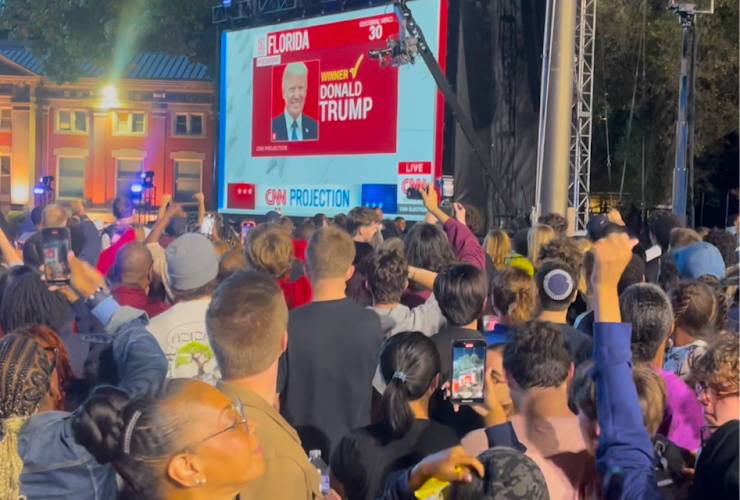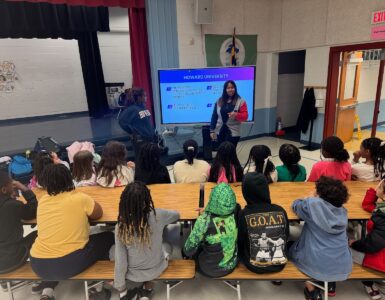Harris-Walz supporters spectate election coverage night on The Yard at Howard University. (Myron Mayne/101 Mag)
The 2024 presidential election was big news for everyone in the United States, but let’s not forget it is also a huge deal for international students. They may not have had a say in the outcome, but the policies resulting from this election—especially, immigration—can shape their entire experience in this country.
Take Layla Pottinger, for example, a sophomore speech-language and pathology major from Canada.
“The recent election has made me question what life in the U.S. might look like for me,” she said. “As a Black woman with international roots, I’m thinking about whether staying here could end up clashing with my political and moral beliefs.”
Pottinger isn’t the only one weighing her options, but as a STEM major, she feels more confident about her career prospects than others. Job security is a big worry for many international students, especially those in fields with fewer opportunities or less visa support.
“I know I’m in a good spot, but not everyone has that same stability,” Pottinger said.
However, that sense of stability might not last when Trump returns to office. According to a story published in Forbes Magazine, programs like Optional Practical Training (OPT)—which allows international students to gain valuable work experience in the U.S.—could face big changes.
For STEM students, OPT offers up to three years of work authorization after graduation. There’s a possibility that during Trump’s second term, he’ll add stricter rules that could make the program too complicated for both students and employers to navigate.
These restrictions could limit opportunities for everyone, not just those in STEM.
For many, the uncertainty around stricter immigration policies adds extra pressure to an already challenging path.
Additionally, international students are concerned about their safety. While Pottinger feels fortunate that her background as a Canadian helps her navigate American customs, she also acknowledges that being in the U.S. isn’t always comfortable.
“I don’t always feel safe, but that’s more about the social climate than my international status,” she pointed out.
Furthermore, Pottinger thinks that financial aid, or lack thereof for international students deserves more attention.
“It’s frustrating that we don’t qualify for the same kind of support as domestic students,” she said.
With tuition and living costs piling up, financial insecurity adds significant stress for many students. Raising the minimum wage requirements for H-1B visa holders and green card applicants during Trump’s first term forced many employers to second-guess hiring international students.
Trump’s second term could see similar efforts, creating some uncertainty for students hoping to stay in the U.S.
Despite these challenges, Pottinger isn’t ready to write off the U.S. entirely.
“Right now, I’d still recommend studying in the U.S. to friends back home,” she admitted. “But I’d tell them to be careful because we don’t know how things will play out under the new administration.”
Pottinger’s story serves as a reminder that the 2024 election impacts more than just citizens—it is shaping the futures of thousands of international students. While they’re pursuing their dreams in America, they’re also navigating uncertainty about their safety, finances, and opportunities.
It’s a perspective worth keeping in mind as the U.S. moves forward. “With policies like limiting OPT, stricter visa requirements, and reduced work authorization for spouses of visa holders potentially on the horizon, the stakes are higher than ever under the new administration.”










Recent Comments